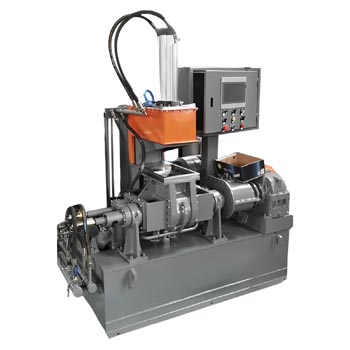Thermoplastic elastomers is short of TPE, it is one kind of special materials combining the elasticity of rubber with the processability of plastics. TPE material is very common in our dairly life ,it is widely used in automotive parts, footwear, medical devices, seals, and soft-touch consumer products.
Lab kneaders ,as one compact internal mixer machine which are specially designed for small-batch, high-viscosity mixing processes in laboratories and pilot-scale operations.
These lab kneader for thermoplastic elastomer compounding specially designed to handle such high-viscosity, elastic, and heat-sensitive materials like Thermoplastic Elastomers (TPEs) , they plays a crucial role to ensure consistent performance, strength, and flexibility, they ensure proper compounding and dispersion of additives and fillers in small batch or R&D settings.
What Is a Lab Kneader?
The lab kneader usually come with sigma blades or Z-blades, a closed mixing chamber, and temperature control systems to deal with sticky, elastic, or highly filled materials — like TPEs.
Why Use a Lab Kneader for TPE Compounding?
✅ 1. High Shear & Viscosity Handling
Since TPEs may be viscous and elastic material, especially when it is mixed with fillers ,oils, or functional additives. At this situation ,the lab kneader offer several advantage ,such as :
1. Strong mechanical shear
2. Slow and powerful mixing
3. Ability to knead materials with viscosities >500,000 cps
✅ 2. Excellent Filler Dispersion
Sometimes ,the TPE are mixed in the small batch mixer for TPE testing ,it need to added other additives or fillers , such as talc, calcium carbonate, or reinforcing agents etc ,which must be evenly distributed and dispersed completely . At this situation ,the small batch mixer for TPE testing can offer benefit as follows :
1. Uniform compound structure
2. Homogenous blending of polymers and fillers
✅ 3. Temperature-Controlled Mixing
Since TPEs are sensitive to thermal , especially grades like SEBS, TPU, or TPO. A lab kneader offer advantages as follows :
1. Heating/cooling jacket on chamber and blades
2. Accurate process temperature control
3. Prevention of premature degradation
✅ 4. Vacuum or Pressure Mixing (Optional)
Because in many case , the TPE material need to be process with air situation . In order to eliminate air bubbles and improve compound density, some advanced lab kneader for heat-sensitive TPE materials can be equipped with vacuum function ,they offer advantage as follows:
1. Vacuum mixing to remove entrapped gases
2. Pressure-tight chambers for reactive blending
✅ 5. Small Batch Efficiency
These lab-scale kneader for thermoplastic rubber are mainly used in mixing, kneading and crushing of high-viscosity, high-elastic-plastic rubber ,plastic ,polymer ,TPES materials in universities and material institute ,they are ideal for:
* Formulation trials
* R&D scale-ups
* Color and additive masterbatch creation
* Prototyping for new TPE grades
How Do Lab Kneaders Work for Thermoplastic Elastomers?
Let’s break down how they work for TPE processing:
1️⃣ Feeding the Materials
Firstly ,the TPE mateiral in the form of pellets are fed into the lab kneader by operators, together with block copolymers, oils, fillers, plasticizers, or additives into the closed mixing chamber.
The mixing chamber can be manually or pneumatically sealed to ensure airtight mixing, which is useful for materials that are sensitive to air or moisture.
2️⃣ Sigma or Z-Blade Mixing Action
The twin sigma or Z-shaped blades rotating at different speeds in opposite direction Inside the mixing chamber, they create strong shear force and compression to the compound material ,so that the TPE material are mixed , blend and homogenized evenly.
This shearing and kneading force is ideal for softening, melting, and uniformly dispersing additives throughout the sticky, rubbery TPE base.
3️⃣ Jacketed Equipped for Temperature Control (Heating or Cooling)
This high-performance kneader for TPE formulation have jacketed chambers and rotors that allow heating (via oil or electric) or cooling (via water circulation).
Wide Applications of TPE Using Lab Kneaders
The TPEs material can be used in many industries with the lab kneader ,such as :
* Medical tubing, grips TPE-S (Styrenic block copolymers)
* Automotive seals TPE-O (Olefinic blends)
* Wire & cable TPE-E (Thermoplastic polyester elastomers)
* Over-molded consumer goods TPU (Thermoplastic polyurethane)
In summary , a small batch mixer for TPE testing can handle high viscosity, disperse additives uniformly, and control temperature well , it is an essential equipment used in the formulation and testing of thermoplastic elastomer (TPE) materials. ,and very ideal for research, development, and quality control labs.
Whether you are developing new TPE grades, customizing hardness, or testing filler compatibilities, the lab kneader for heat-sensitive TPE materials delivers performance, precision, and repeatability.
Here ,in Simptek ,we can tailored and custom made different lab kneader ,open mixing mixer as per your needs .
If you have any question or need any assistance about th lab-scale kneader for thermoplastic rubber ,welcome to talk with our experts at your convenience .







